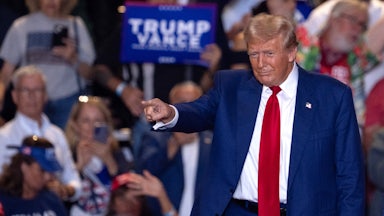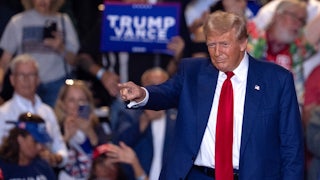Donald Trump was, by his standards, quite clear in his meaning during his Sunday morning Fox News appearance. Host Maria Bartiromo had dangled the suggestion that immigrants from China, and those with criminal records, were crossing the southern border illegally and might cause violence on Election Day. But Trump, likely to Bartiromo’s surprise, refused the obvious layup.
“I think the bigger problem is the enemy from within, not even the people that have come and are destroying our country—by the way, totally destroying our country. The towns, the villages, they’re being inundated,” Trump said. “But I don’t think they’re the problem in terms of Election Day. I think the bigger problem are the people from within. We have some very bad people. We have some sick people, radical left lunatics, and it should be very easily handled by, if necessary, by the National Guard, or if really necessary, by the military, because they can’t let that happen.”
But Governor Glenn Youngkin, when asked about Trump’s comments Monday on CNN, claimed to have heard something entirely different. “It’s my belief that what former President Trump is talking about are the people coming over the border,” said the Virginia Republican. When Tapper pointed out that Trump had explicitly referred to “the enemy from within,” Youngkin accused Tapper of “misinterpreting and misrepresenting his thoughts.”
TAPPER: What do you think of this idea that 'we have some sick people who should be easily handled by the National Guard or military.' Do you support that?
— Aaron Rupar (@atrupar) October 14, 2024
GLENN YOUNGKIN: It's my belief that what former President Trump is talking about are the people coming over the border pic.twitter.com/Hojcn1c9nJ
Youngkin’s evasion is an increasingly common one among Trump’s supporters and surrogates: Confronted with the authoritarian musings of the Republican nominee, they insist that the actual meaning of Trump’s comments is more innocuous, and accuse the media and Democrats of distorting the truth. But they said this back in 2016 too, and then Trump’s first term made it abundantly clear that he often means just what he says—and intends to act on it.
In the closing stretch of the 2016 election, conservative journalist Salena Zito famously wrote of Trump in The Atlantic, “The press takes him literally, but not seriously; his supporters take him seriously, but not literally.” That is, the press thinks Trump himself is kind of a joke, but takes everything that comes out of his mouth at face value, whereas his supporters don’t believe every word he says but do take him seriously as a political leader.
As supporters of Trump as a candidate and then president-elect seized on the motto as cover for his more ludicrous promises, conservative commentator Jonah Goldberg observed in December 2016 that, while useful as an “analytical insight into how … Trump communicated with his supporters,” it’s “fairly ridiculous hogwash as a prescription for how to treat an actual president, or president-elect.”
Nonetheless, as Axios reported this week, this Zito-ism has made a comeback of sorts: “Former President Trump’s extreme rhetoric is making life uncomfortable for Republicans in the final weeks of the campaign, prompting some surrogates to revive the 2016 disclaimer: ‘Take him seriously, not literally.’”
It’s not just Youngkin. Kellyanne Conway—who, in 2016, bemoaned that journalists “always want to go by what’s come out of [Trump’s] mouth rather than look at what’s in his heart”—told The New York Times on Monday, “People have a very good sense of sussing out [his] rhetoric from reality.” Trump adviser Scott Bessent was quoted in the Financial Times on Sunday as saying “his general view” of Trump—who recently called tariffs “the most beautiful word in the dictionary”—is “that at the end of the day, he’s a free trader.”
Some voters also share these sentiments. The New York Times’ Shawn McCreesh wrote Monday about Trump supporters who “are happy to vote for him because they simply do not believe he will do many of the things he says he will.” Waving away Trump’s plans for hefty tariffs, mass deportations, and revenge against his political opponents as mere rhetoric, these voters—many hoping that his presidency would be good for business—give him what McCreesh calls “a reverse benefit of the doubt. They doubt; he benefits.”
The idea that it’s alarmist to take a presidential candidate at his word seems odd on its face. Among other problems, how can one be expected to divine a candidate’s agenda without listening to their words? But it’s particularly absurd as a defense of Trump, whose rhetoric regularly translated into action during his time in the White House.
In October 2016, not long after Zito’s piece was published, Peter Thiel invoked the seriously-not-literally adage in reference to Trump’s plans for a border wall and Muslim ban. “I think one thing that should be distinguished here is that the media is always taking Trump literally. It never takes him seriously, but it always takes him literally,” he said. “I think a lot of voters who vote for Trump take Trump seriously but not literally, so when they hear things like the Muslim comment or the wall comment their question is not, ‘Are you going to build a wall like the Great Wall of China?’ or, you know, ‘How exactly are you going to enforce these tests?’ What they hear is we’re going to have a saner, more sensible immigration policy.”
But Trump was gravely serious about those promises, enacting as president a cruel, nativist immigration agenda that included a ban on immigrants from five Muslim-majority countries as well as a $15 billion wall construction that Trump went to great lengths to fund. He also delivered on promises to withdraw from the Paris climate agreement and appoint justices to overturn Roe v. Wade. And what was January 6, 2021, if not clear evidence that Trump’s election denialism was anything but harmless hyperbole?
Even when Trump didn’t get his way, it was often not for lack of trying. While his calls for retribution against his political opponents have always seemed like outlandish bluster, a recent New York Times report detailed how, as president, he “tried repeatedly to use the powers of the federal government to investigate or penalize those he considered foes.”
In other words, Trump’s rhetoric is best interpreted both seriously and literally. On Monday, former Trump Defense Secretary Mark Esper urged Americans to take “seriously” Trump’s recent comments about the military handling the “enemy from within” on Election Day. “I lived through that,” he said, noting that, during the George Floyd protests, “President Trump and those around him wanted to use the National Guard in various capacities” and “to bring in active duty military as well.”
Further, unfulfilled promises from Trump’s first term—to repeal Obamacare or end birthright citizenship, for instance—by no means guarantee he couldn’t follow through on them should he secure a second. As Andrew Prokop explains in Vox, numerous institutional “guardrails” constraining the executive during Trump’s presidency have since been “weakened.” Project 2025, the Heritage Foundation’s now-notorious blueprint for a future Republican president to overhaul the federal government, would erode them further. Thanks to the Supreme Court’s ruling in Trump v. United States, if elected again, Trump would enjoy immunity from criminal prosecution, even, per the ACLU, for “turning the Armed Forces against political opponents, using the Justice Department to investigate or prosecute critics of the president, or worse,” so long as his actions constituted “official acts.”
The suggestion that we can assess Trump’s candidacy without regard for the literal content of his speech also assumes that clear and dependable communication is just incidental to the chief executive’s role. In reality, the actual language of the president is of immense consequence. Trump wielded the bully pulpit to incite an attempted insurrection; promote junk cures during the Covid-19 pandemic; pick Twitter fights with world leaders; and sow tension, confusion, and suffering in untold other ways. The barrage of destructive rhetoric he’s unleashed since leaving office—most recently his lies about noncitizen voting, Haitian immigrants in Springfield, Ohio, and the government’s hurricane response—suggests he’d continue to do so if elected again, in which case his every remark (yes, his literal words) would once again carry the weight and clout of the presidency. Is it really so reasonable, then, for voters to factor Trump’s more erratic rhetoric out of their election decisions because of what’s supposedly “in his heart”?
As Election Day draws near and Republicans again push the notion of “taking Trump seriously, not literally” despite his plainly despotic vows, an alternative slogan from Kamala Harris’s campaign imparts a simpler and sounder message: “Listen to his words.”






